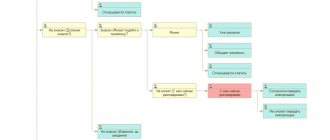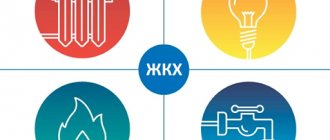According to Art. 153 of the Housing Code of the Russian Federation, all apartment owners are required to regularly make payments for the use of utility services. Otherwise, the management company records the occurrence and accumulation of debt, which can subsequently be collected in court.
The first action of the management company is to send a written notification to the debtor about the existence of arrears for housing and communal services. If there is no response, the case is sent to court (only if the debt has accumulated for 6+ months).
Subsequent actions in relation to the defaulter may be:
- Fine;
- Penya;
- Turning off hot or cold water;
- Power outage;
- Eviction (occurs less frequently than others, as it is the most radical method).
The notification is drawn up in free form. However, there are general recommendations. So, it is better to draw up the document on the letterhead of your management company. The notification must be delivered either personally to the defaulter or by mail (in the form of a letter with acknowledgment of delivery).
The text of the notification must contain the following information:
- The name of the form and its heading;
- City;
- Date of;
- Residential address of the debtor for housing and communal services;
- Last name and initials of the debtor;
- A message confirming the fact that a specific owner of the apartment has a debt indicating the specific amount of the debt;
- Actions that the management company can take if a person refuses to repay the debt;
- Request for debt elimination.
Dear readers! Our articles talk about typical ways to resolve legal issues, but each case is unique. If you want to find out how to solve your specific problem, please contact the online consultant form on the right. It's fast and free! Or call us at :
+7 Moscow, Moscow region
+7 St. Petersburg, Leningrad region
8 Federal number (free call for all regions of Russia)!
When to send
The organization draws up an outgoing document containing a request to make payment in the following cases:
- failure to comply with financial agreements;
- lack of payment for work performed or services rendered in whole or in part;
- ignoring calls, refusing to interact;
- neglect of the deadlines established in the contract for making payments.
IMPORTANT!
In accordance with Art. 125 of the Arbitration Procedure Code of the Russian Federation, the claim procedure for resolving disputes is currently mandatory for most claims. That is, the statement of claim is accompanied by confirmation of the execution of this procedure - a copy of the letter containing a request to pay the bills in the near future, otherwise the claim will be left without progress under Art. 128 Arbitration Procedure Code of the Russian Federation.
Reasons for non-payment
Homeowners do not pay utility bills for various reasons. They can depend both on them and on accompanying situations.
The main reasons for non-payment include the following:
| Absence of the apartment owner at the place of residence | This includes business trips, living in another constituent entity of the Russian Federation and other situations that prevent timely payment of utilities. |
| Loss of capacity | The factor is preceded by an illness or injury characterized by long-term treatment at home or in a hospital. |
| Financial difficulties | Job layoffs, salary reductions, and other financial obligations. |
| Disagreement with tariffs for housing and communal services between the owner and management company | A lengthy settlement process may result in non-payment of the receipt. |
| Living in an apartment with relatives or tenants who are dishonest about paying for utilities | The owner may not be aware of what is happening. |
None of the factors relieves the property owner of responsibility for failure to pay utility bills. In some cases, the absence of the owner at the location of the apartment due to a work trip or illness may be considered by the Criminal Code or judicial authorities as a mitigating circumstance
. In this case, interest and penalties may not be accrued.
Sample notice of debt on utility bills
How to compose
When writing, the general rules of office work are used; the request to pay the debt includes the following blocks:
- sender's name, basic identification details: name, address, TIN. Option: the document is drawn up on official letterhead;
- name of the addressee, address, surname, first name, patronymic of its leader;
- document's name;
- reference to the basis of the relationship - a specific agreement indicating details (date, number, subject);
- the amount of the debt and the name and details of the documents confirming the fulfillment of the obligation and the debt;
- an offer to transfer funds or deposit them at the cash desk indicating the details (account number and other details);
- mention of sanctions (penalty, going to court, increased costs);
- date, signature.
Collection of debt for payment of housing and communal services on the basis of a writ of execution
Question: The debtor avoids receiving a claim (notice) about the need to repay the debt for housing and communal services for non-residential premises and about the intention to apply for a writ of execution. The claimant sent the claim to the legal address, but the debtor does not pick up the letter at the post office. To apply to a notary for a writ of execution, in calculating the debt you must indicate the date when the debtor received the written notice. If the debtor has not received it, the notary will not issue a writ of execution. How should a creditor act in such a situation? Is it possible to go to court through writ proceedings? What must be indicated in the application? Is it necessary to first obtain a notary’s refusal to issue a writ of execution and then appeal it in court? Is it possible to immediately file an application to initiate writ proceedings?
Answer: In our opinion, the claimant can turn to a notary for a writ of execution if the debtor avoids receiving a claim (notice) about the need to repay the debt for housing and communal services and the intention to apply for a writ of execution.
Rationale: Collection of debt for payment of housing and communal services incurred during the use of non-residential premises is provided for in paragraph. 25 clause 1 of Decree N 366. On this basis, it is possible to collect debts for payment of consumed electrical energy, water, thermal energy, gas.
The list of documents for making a writ of execution on the specified basis contains clause 24 of the list of documents for which collection is carried out on the basis of writs of execution (hereinafter referred to as the List).
Such documents include a calculation of the debt indicating the date of notification of the debtor about its existence, signed by the head or other authorized official of the collector.
In practice, the question often arises of what is meant by the date of notification to the debtor. Situations when he evades receiving notification from the collector about the existence of a debt or when he is absent from his legal address are not uncommon.
First, we propose to figure out whether the date of notification to the debtor, which is discussed in paragraph 24 of the List, is identical only to the date of actual receipt of the correspondence by the debtor. We believe that such an identity does not follow from the literal interpretation of the above norm. It should not be concluded that if the debtor for some reason refuses to receive the letter, this will be an obstacle to contacting a notary.
Paragraph 24 of the List only says that the collector must indicate the date of notification to the debtor about the existence of the debt. At the same time, neither the List nor other acts of legislation regulating issues of notarial activity establish what exactly must be understood by a notice.
We believe that in order to understand the meaning of paragraph 24 of the List, it is necessary to turn to a systematic interpretation of this rule by comparison with other similar rules of law.
In business proceedings, the presumption of proper notice is used. A person is considered to have been properly notified not only if there is information that the addressee has received correspondence sent to him, but also if:
1) the addressee refused to receive correspondence and such refusal was recorded;
2) the addressee did not show up for the correspondence, as reported by the communications authority;
3) correspondence sent to the last known location of the legal entity was not received due to its absence at the specified address, as reported by the communications authority <*>.
Since clause 24 of the List uses the term “notice” and not “receipt”, we believe that it is fair to extend the understanding of proper notification to the situation of the claimant applying for a writ of execution. This approach will protect the collector from dishonest actions of the debtor, who specifically refuses to receive correspondence in order to delay the debt collection procedure.
Separately, it should be noted that clause 24 of the List requires the claimant to indicate only the date of notification to the debtor. At the same time, it does not oblige you to explain what exactly the collector understands by the date of notification: the date of actual receipt by the debtor of the correspondence or the date of return of the letter due to the debtor’s evasion of receipt.
In addition, paragraph 24 of the List does not oblige the claimant to submit to the notary documents confirming the notification of the debtor about the existence of a debt. The notary has no right to require from persons applying for notarial acts to submit other information and (or) documents other than those specified in clause 24 of the List <*>.
As for writ proceedings, the presence of grounds for debt collection through a notary’s writ of execution is an obstacle to the court’s acceptance and consideration of an application to initiate writ proceedings. Thus, if the claimant has the grounds provided for in Part 1 of Clause 1 of Decree No. 366 to apply for a notary’s writ of execution to collect the debt, such claims are not considered in courts of general jurisdiction in the order of writ proceedings <*>.
In practice, a situation is possible when the claimant formally has the grounds for collecting the debt by means of a writ of execution, provided for in Part 1, Clause 1 of Decree No. 366, but there are not enough documents specified in the List, or these documents do not meet the requirements of Art. 66 of the Law on Notaries (for example, available only in scanned copies).
In our opinion, in this case it is possible to file an application to initiate writ proceedings without having to contact a notary and be refused to perform a notarial act. However, in order for the court to accept the application, it must justify why the claimant does not have the grounds and the opportunity to apply for debt collection by means of a writ of execution.
If we talk about the situation when the debtor avoids receiving a properly sent notice of the existence of a debt to pay for housing and communal services, then the lack of opportunity to contact a notary is not obvious. And the decision to accept or refuse to accept an application to initiate writ proceedings will depend on the individual judge.
In the case considered, we recommend contacting a notary, indicating as the date of notification to the debtor the date of proper notification, determined in accordance with Art. 142 COD. If a notary refuses to issue a writ of execution, a written refusal must be requested. And with a copy of it, you can apply to initiate writ proceedings.
Sample
Legislative acts do not contain a sample request for debt payment; a unified form has not been approved. Each organization has the right to develop its own form.
| Limited Liability Company "Aramis" TIN 4501001055, address: Kurgan, st. Gorky, 1 Director of Atos LLC 640000, Kurgan, st. Krasina, 7 Ref. No. 9 of May 12, 2021 According to contract No. 3 dated 04/07/2020, your organization has a debt in the amount of 7,000 (Seven thousand) rubles. It is confirmed by the acceptance certificate dated April 10, 2020, and the reconciliation report dated April 10, 2020. I ask you to pay off the debt out of court. I remind you that in case of going to court, Aramis LLC has the right to recover expenses for paying for the services of a representative, and the return of the paid state duty. In addition, we have the right to impose a penalty under clause 5.5 of the Supply Agreement (0.1% of the debt amount for the day of delay). Please transfer the specified amount of 7,000 rubles as soon as possible to: Account: No. 40702 910 77822 0000 333 at the Branch of OJSC JSCB ALFABANK, Kurgan, cor. account 30101810000000000777; BIC 045407799. If payment is not made within 10 days after receipt of the letter, we reserve the right to apply to the Arbitration Court to collect the amount of the debt. Director Sokol D.D. |
Why debt occurs
Debt obligations entail a lot of negative consequences. They can arise under various conditions, usually due to untimely fulfillment of monetary obligations.
Utility debt may arise under the following circumstances:
- late payment of housing and communal services;
- complete non-payment;
- submission of false documents regarding the right to a housing subsidy, etc.
Debt may entail other consequences in the form of depriving a citizen of the right to receive water, electricity, gas, etc. This occurs by blocking pipes, sluices, lights, etc.
A citizen is obliged to pay monthly fees for the use of housing services, for major repairs of engineering infrastructure, individual property of an apartment building, etc.
Sources
- Evgenia Nikolaevna Romanenkova History of the Russian state and law. The most important; Prospect - M., 2001. - 784 p.
- Banking Law / Team of authors. - M.: Yurayt, 2011. - 111 p.
- History of state and law of Russia: Textbook / ed. Yu.P. Titova. - M.: Prospekt, 2003. - 544 p.
- Nadezhda Nikolaevna Tarusina Gender in law. Monograph: monograph. ; Prospect - M., 2021. - 646 p.
- Popova V.I. Regional aspects of neglect of minors. Socio-economic approach; SYNTEG - Moscow, 2009. - 595 p.
Response time
The document requests that the debt be repaid as soon as possible, but the counterparty has time to respond. In accordance with Art. 452 of the Civil Code of the Russian Federation, business customs, judicial practice, the response is given for less than a month, unless a different period is established in the claim or agreement. Paying the debt is one of the answer options; more often the addressee receives a letter of guarantee or an appeal with a proposal to postpone the deadline for fulfilling material obligations, which are considered on an individual basis.
What it is
The wording given by the legislator regarding utility payments characterizes it as a payment for services provided by housing and communal services and management companies. The services provided are not only the most in demand among Russians, but also necessary, without which full-fledged life in modern society is impossible.
Each residential and/or industrial premises must be supplied with water, gas, electricity and heat. If the premises are not equipped, it cannot be recognized as residential for people to live in it. For production purposes, the consumption of utilities is necessary for the enterprise or institution to perform certain tasks.
Housing and communal services are responsible for removing garbage on time, ensuring the operation of the elevator and cleaning the surrounding area, minor and major repairs of an apartment building, etc. Calculation of utilities is carried out in accordance with standards adopted at the federal and regional levels.
For debt to arise, usually the payer has good reasons why he does not make payments on time. At the same time, the utility company sends a notification not only when the payer is in arrears, but also in other cases.








